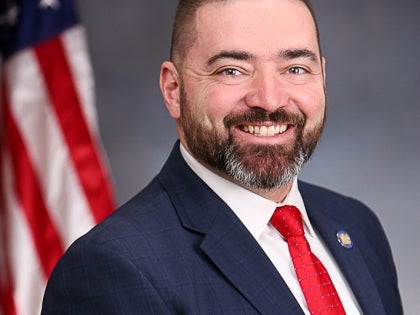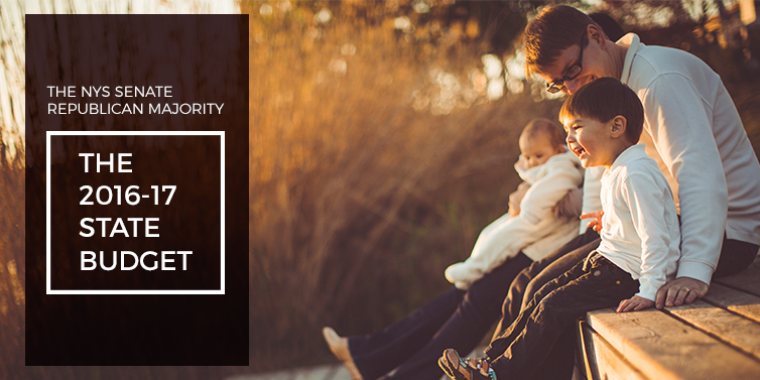
NYS Budget: Senator Fred Akshar Pushes Back Against Dramatic Minimum Wage Increase, Votes to Cut Taxes for Middle Class Families and Businesses, Increase School Aid and Cap State Spending
April 1, 2016

This week Senator Fred Akshar voted in favor of the 2016-17 State Budget that pushes back against the dramatic, downstate-backed minimum wage increase and includes one of the largest income tax reductions in history for middle class taxpayers.
“My priority going into this Budget was to fight to make sure Upstate was treated fairly,” said Senator Fred Akshar. “I don't mind a good fight if it leads to a better outcome for the people back home I care about and represent. I'm not happy about the business climate Upstate. We still have a lot more work to do to make New York State a better place to do business.”
The Budget increases school aid by $1.5 billion and eliminates the Gap Elimination Adjustment (GEA) education funding cuts and ensures regional balance in infrastructure investments.
New Middle Class Income Tax Cut:
Millions of middle class New Yorkers will be eligible for a new tax cut that totals $6.6 billion over the first four years and brings middle class income taxes down to the lowest rate since 1948. By 2025 when the tax cut is fully phased in, it will provide an average savings of over $700 per family per year.
“I've traveled thousands of miles in my District and I've heard first-hand about very real financial struggles hardworking families and business owners everywhere are facing. Working to keep more hard-earned money in their pockets was incredibly important to me and them,” said Akshar. “These middle class tax cuts are tangible results for the people I represent.”
Capping State Spending:
For the sixth straight year, the budget stays within the self-imposed two-percent spending cap. This fiscal restraint has already saved New York taxpayers a cumulative total of approximately $31 billion.
“Families, school districts and local governments in my District work very hard to keep their budgets in check and we need to do the same thing in state government,” said Akshar.
Property Tax Savings:
This year’s budget funds $3.3 billion in STAR savings for property taxpayers, with the average savings of $350 per eligible household.
Record School Aid:
Schools will see a $1.5 billion increase in aid in this year’s budget for a record total education investment of nearly $25 billion. This increase is hundreds of millions of dollars over the original Executive Budget proposal and when combined with the STAR school tax relief program, the state’s total commitment to supporting public education is more than $28 billion this year.
“We raised school aid by record amounts and doubled the Foundation Aid the Governor proposed for our schools,” said Akshar. “We finally ended the Gap Elimination Adjustment that gutted funding for upstate schools in 2010. This will help schools provide quality education while still operating under the 2% Property Tax Cap.”
Heroin Prevention, Treatment, and Recovery:
The final budget includes $166 million in funding to help address the challenging public health crisis caused by heroin and opioid abuse in communities throughout the state.
“Funding to support the right mix of treatment, prevention, enforcement and education in our fight against the heroin scourge has been on my top priorities,” said Akshar. “This requires a community approach from all levels of government.”
Fairness in Funding to Improve the State’s Roads and Bridges:
The budget included on of Senator Akshar's priorities of ensuring fair transportation funding for Upstate New York. It includes a record $27.1 billion transportation capital plan to achieve true parity in infrastructure funding between upstate and downstate.
The state’s Consolidated Local Street and Highway Improvement Program (CHIPS) will receive $438 million this year to help local governments move forward with important local highway, road, and bridge repair projects.
“Upstate needs to be treated fairly when it comes to infrastructure,” said Akshar. “It's that simple.”
Slowed Minimum Wage Increase For Upstate:
A hard-fought minimum wage compromise was reached in the Budget to prevent a $15/hr minimum wage hike for businesses in Upstate New York. While the minimum wage in New York City will increase to $15/hr in 3 years, Upstate wages would gradually increase to $12.50/hr over 5 years. After 2021, the minimum wage would increase on an indexed schedule to be set by the Director of the Division of Budget (DOB) in consultation with the Department of Labor until eventually reaching $15/hr.
“This was an extremely tumultuous fight during Budget negotiations,” said Akshar. “The Governor and the Assembly didn't want anything less than a $15/hr for everyone. After speaking with local business owners across my district, there was no way I could support their $15/hr plan for Upstate businesses. Quite frankly, I'm not happy the minimum wage Upstate is going up at all.”
The agreement provides a safeguard that would prevent the wage from increasing should the economy take a turn for the worse. Beginning in 2019, the state DOB Director will be responsible for conducting an annual analysis of the economy in each region and will be charged with determining the effect of the minimum wage increases is having statewide to determine whether a temporary suspension of the scheduled increases may be necessary.
The Governor's Wage Board—a body that was making these decisions unilaterally and irresponsibly has been suspended.
Senator Akshar stressed the importance of fighting for a better business climate for Upstate New York throughout the rest of Legislative Session.
“We need to do more for businesses,” said Akshar. “We're still at the bottom in terms of business climate, and this is unacceptable. We still need to repeal the 18-A energy surcharge. We need to extend the STAR Property Tax Rebate to Small Businesses. We need to reduce unnecessary red tape and regulations. We need to reform Workers Compensation. I'm not going to stop fighting. I'm fired up.”
For more details on this year's Budget, please click here.
Share this Article or Press Release
Newsroom
Go to Newsroom


